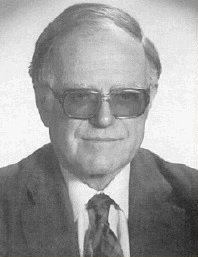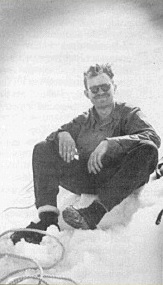born: Jan 20, 1920 in Everett, Washington
Made fundamental contributions to functional analysis, measure theory, and topology, as well as Diophantine approximation, the structure of semi-groups and abstract harmonic analysis. An outgoing bon vivant who enjoys people, mathematics, and travel.
Mathematicians are judged by their mathematics not their social graces, and some important mathematicians have been social misfits. Most, however, are rather ordinary people, socially. And a few are even very adept socially, collecting large numbers of friends, collaborators and pleasant adventures while still doing important mathematics. Edwin Hewitt is in this last group. His life, and his comments about it, show that it is possible to enjoy life, enjoy people, and also enjoy and do first-rate mathematics.
Hewitt’s own words perhaps best describe the man and the fun he has had. The article they are extracted from even more strongly conveys the number of good friends he made and the pleasure he had knowing them.
“My early memories are for the most part happy, though I carry to this day recollections of stern discipline meted out for this or that childish crime.”
“I suppose I was precocious, though by no means a prodigy.” “I learned mathematics and French with little effort. In grammar school I had a hard time with written arithmetic, though mental arithmetic and word problems were simple. At 10 years of age I heard about logarithms, at 13 about trigonometric functions.”
“I was an insufferable child. I had — and still suffer from — a terrible habit of mouthing off. Recognizing this weakness has at least preserved me from the folly of becoming a department chair or dean: I knew that at some inopportune moment I would lose control of my tongue and then lose my job.”
Hewitt entered Harvard on a full scholarship ($500 per year!) as an undergraduate at 16. “With waiting on tables for my meals and savings from summer jobs, I had no money problems.” He received his Ph.D. there at age 22. “My six years at Harvard were happy. I melted into the crowd, no longer an underage, undersized misfit. The mathematics faculty was awe-inspiring.” He remained there as an instructor for six months before becoming a civilian scientist for the US Air Force in England during World War II. “I was put onto the problem of defending B-17 and B-24 bombers against German fighter planes.” . . . “I felt it necessary to fly and wound up with seven missions to Germany and France as a bombardier-gunner.”
He spent the year 1945-46 at the Institute for Advanced study in Princeton on a Guggenheim Foundation award, and then took a position at Bryn Mawr College for one year. “I was not housebroken enough for Bryn Mawr.”
He moved permanently to the University of Washington in 1948 where he remained until his retirement except for teaching visits to Sweden (1951-52), Russia (1969), Germany (1975-76, 1986), the Univ. of Texas (1972-73) and the Univ. of Alaska (1982).
“In Princeton in 1956 I ran into E.P. Wigner at a party given by Kees Gugelot and wrote a paper with him at the party.” This is unusual even for mathematicians.
“Teaching has been a vital part of my career. I love to get in front of a class or a colloquium audience — any audience, in fact.”
At the University of Washington: “I found myself picking up doctoral students. I was enthusiastic about mathematics; I gave lectures that were attention-getters though not show-stoppers; and over the years a number of fine young men and women came to me for guidance as they worked toward the doctorate.” Hewitt supervised 37 students who earned doctorates in mathematics.
“I spent the years 1973-1975 as vice-chairman and chairman of the University of Washington Faculty Senate. This was good sport but of negative value to my career as a mathematician.” . . . “The fact is, of course, that the faculty have no power in running the university.” . . . “But the hard-eyed businessmen who run the university are not really interested in research or even in teaching. Naturally they like intercollegiate football.”
“I’ve been a fortunate fellow. I’ve climbed some nontrivial mountains. I’ve skied across Lapland. I’ve driven 165 miles per hour in motor car. I’ve known some wonderful women, two of whom I’ve married.”
He retired in 1986. “Since then I’ve taught part-time at the University of Washington, traveled and lectured in 11 countries, and done a certain amount of research. I am learning Chinese.” “Here I am, still having fun and grateful for every new experience.” So far, so good.
That was 1988. In January, 1989, while attending a mathematics conference in Phoenix, Hewitt suffered a massive stroke, which affected his speech, numerical abilities and other functions. Still, he continued to live alone and enjoyed entertaining friends. A subsequent stroke, along with other health problems, forced him into a nursing home.
All quotations are from “So Far, So Good: My Life Up to Now” by Edwin Hewitt in The Mathematical Intelligencer, vol. 12, No. 3, Summer 1990, pp. 58-63. The entire article in well worth reading. DTH
Last Updated September 22, 2022


